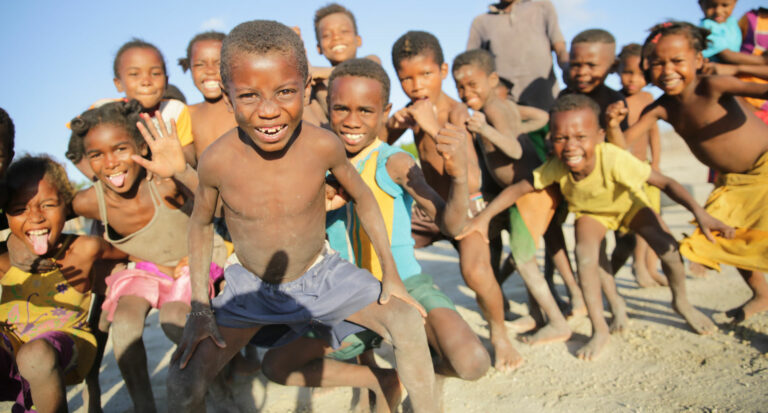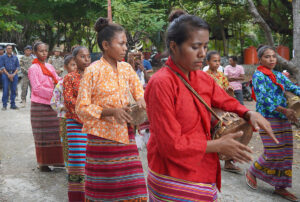Following a reproductive health needs assessment conducted earlier this year, Blue Ventures is launching a community health programme in the Belo sur Mer area, integrating closely with on-going marine conservation initiatives. The programme will initially reach 8,000 people across 10 villages, and represents the first replication of Blue Ventures’ award-winning Population-Health-Environment (PHE) approach beyond the Velondriake area.
Madagascar’s southwest coast is home to semi-nomadic Vezo fishing people who are among the poorest and most isolated in the country, lacking access to basic health education and services. They depend on the marine environment for their food, income and cultural identity, but the sustainability of their livelihoods is threatened by overfishing as they struggle to provide for their growing families.
Blue Ventures has therefore developed an integrated Population-Health-Environment (PHE) approach that empowers coastal communities to live more healthily and sustainably alongside their unique marine environment; this encompasses temporary fisheries closures, locally managed marine areas, aquaculture enterprises, community health education and family planning service provision. Sir David Attenborough has endorsed it as “a model for everyone working to conserve the natural life-support systems of our troubled planet”. The programme has been running in the Velondriake area since 2007, resulting in a fivefold increase in the use of contraceptives, with smaller and healthier families better able to sustainably manage their marine resources.
Blue Ventures started working with communities in the Belo sur Mer area from late 2009, focusing on marine protected area establishment in partnership with the Madagascar National Parks service, and locally managed mangrove reserves for mud crab fisheries in partnership with ARDA. It soon became apparent that addressing unmet family planning needs would be key to supporting these conservation efforts, with the local population set to double every 10 years.
Following initial consultations in 2010 and 2012, Blue Ventures conducted a thorough reproductive health needs assessment in the Belo sur Mer area in early 2013, involving more than 250 people through surveys with community members and key informant interviews with health agencies, service providers and village leaders. The study yielded an in-depth understanding of local needs, highlighting important issues including limited sexual health knowledge as well as poor access to and uptake of family planning services.
Widespread fears about contraception are evident, with 40% of people believing that contraceptives can cause disease, and 42% of men not supporting the use of contraceptives due to concerns that they can be harmful to women or cause sterility. Knowledge of long-acting reversible contraceptive methods such as implants is very limited at around 10%, although 50% of people are aware of contraceptive pills and injections.
Youth are identified as a particularly vulnerable group, with the average age of sexual debut reported as 15-16 years and only 3% of people using contraceptives the first time they have sex, resulting in the vast majority of young women becoming pregnant by the age of 20.
The area’s three public health centres are located up to 15 kilometres away from some villages, and the contraceptive prevalence rate[1] is just 15% compared to the national average of 40%. All of these findings point to significant unmet reproductive health needs in the Belo sur Mer area. In response, Blue Ventures is replicating its successful Population-Health-Environment (PHE) approach, and tailoring it to the local specificities of the region.
Working in partnership with MAHEFA and Population Services International, Blue Ventures will shortly be training and supporting local women to act as community-based distributors, so that they can offer family planning advice and a variety of contraceptive options within their villages. Educational activities using interactive community presentations and workshops will raise awareness about health and environmental issues, encouraging uptake of family planning services and positive behaviour change. Integrating messages in this way has been proven to engage both men and women in these topics by highlighting the links between reproductive health, family size, food security and sustainable fisheries management.
This community health programme will initially reach 8,000 people across 10 villages in the Belo sur Mer area, and represents the first replication of Blue Ventures’ award-winning Population-Health-Environment (PHE) approach beyond the Velondriake area.
Notes for editors:
Blue Ventures works with local communities to conserve threatened marine ecosystems and coastal livelihoods. Please contact Laura Robson for more information about Blue Ventures’ integrated Population-Health-Environment (PHE) approach and new community health programme in the Belo sur Mer area. Blue Ventures proactively seeks to encourage and support other organisations to adopt this integrated PHE approach, with the aim of empowering more communities to live healthily and sustainably alongside their unique natural environment.























